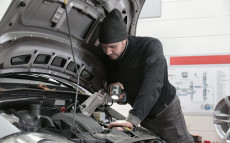- pathfindersAI
- Job Profile
Electronic Equipment Installers and Repairers, Motor Vehicles
Summary
Career Navigator: Electronic Equipment Installers and Repairers, Motor Vehicles
What They Do
In the dynamic and evolving landscape of automotive technology, Electronic Equipment Installers and Repairers, Motor Vehicles carve out a specialized niche. These professionals are tasked with installing, maintaining, and repairing various electronic systems integrated into modern motor vehicles. From intricate navigation systems and advanced audio setups to sophisticated climate control mechanisms and essential safety features, they ensure the seamless operation of electronics that drivers and passengers have come to rely upon. Their role is integral as vehicles become increasingly reliant on technology, making their expertise indispensable in the automotive industry.
Job Responsibilities
The primary responsibilities of Electronic Equipment Installers and Repairers in motor vehicles are multifaceted, reflecting the complexity of the systems they work with. They begin with diagnosing electronic issues using specialized diagnostic equipment and software. Once a problem is identified, they proceed with repairs which may involve replacing faulty components, re-soldering connections, or recalibrating systems to factory specifications. Installation duties include fitting new or aftermarket electronic systems as per manufacturer guidelines or customer preferences. Additionally, they conduct routine maintenance checks to preempt potential failures and ensure longevity and efficiency of the electronic systems. Keeping up-to-date with the latest technological advancements and integrating these into their practice is a perpetual part of their professional development.
Essential Skills
The role demands a robust array of technical and soft skills. Foremost, a deep understanding of electronic systems and their integration within motor vehicles is crucial. Proficiency in using diagnostic tools and interpretative software is indispensable. Critical thinking and problem-solving abilities are equally paramount as these professionals often troubleshoot complex issues under time constraints. Manual dexterity and attention to detail are essential, ensuring precise installations and repairs. Additionally, strong communication skills enable them to explain problems and solutions to clients clearly and concisely. Finally, a commitment to continuous learning is vital, given the rapid pace of technological advancements in the automotive sector.
Educational Pathways
Aspiring Electronic Equipment Installers and Repairers can embark on various educational pathways to enter this field. Typically, a high school diploma or equivalent is the basic requirement. Subsequently, pursuing postsecondary education in auto mechanics, automotive technology, or electronics can provide a solid foundation. Many community colleges and technical schools offer relevant associate degree programs or certificates. Practical, hands-on training through internships or apprenticeships is invaluable, providing real-world experience under the guidance of seasoned professionals. Additionally, certifications such as the Automotive Service Excellence (ASE) can enhance job prospects and credibility in the field.
Career Prospects
The career prospects for Electronic Equipment Installers and Repairers in motor vehicles are promising, driven by the continued integration of advanced electronics in vehicles. The Bureau of Labor Statistics projects steady demand for these professionals, especially those well-versed in the latest technologies. Opportunities abound in various settings, including automotive repair shops, dealerships, and specialized electronic service centers. With experience and continuous education, some professionals advance to supervisory roles or start their own businesses. The evolving nature of automotive electronics, encompassing electric and hybrid vehicles, further diversifies career opportunities, making this field both exciting and rewarding.
Conclusion
Electronic Equipment Installers and Repairers, Motor Vehicles occupy a vital position in the intersection of automotive functionality and cutting-edge technology. Their expertise ensures that the myriad of electronic systems within modern vehicles operate flawlessly, enhancing safety, convenience, and overall driving experience. Through a blend of technical knowledge, meticulous skills, and ongoing education, these professionals not only meet current demands but also position themselves at the forefront of a continually advancing industry. As vehicles become ever more sophisticated, the significance of their role—and the opportunities available to them—will undoubtedly grow. Pursuing a career in this field promises a challenging yet fulfilling journey, with the chance to make substantial contributions to the future of automotive technology.
Video
Compensation
| State | Median Salary | Median Hourly | Positions |
|---|---|---|---|
| KS | 38,960 | 18.73 | 330 |
| KY | 52,850 | 25.41 | 120 |
| LA | 38,190 | 18.36 | 70 |
| MA | 47,630 | 22.90 | 80 |
| MI | 47,990 | 23.07 | 280 |
| MN | 57,250 | 27.52 | 160 |
| MO | 38,520 | 18.52 | 290 |
| NE | 48,380 | 23.26 | 80 |
| NV | 52,590 | 25.28 | 80 |
| NJ | 45,490 | 21.87 | 130 |
| NC | 39,200 | 18.85 | 150 |
| ND | 47,340 | 22.76 | 70 |
| OH | 47,810 | 22.99 | 400 |
| OK | 43,710 | 21.01 | 60 |
| OR | 43,710 | 21.01 | 90 |
| PA | 44,510 | 21.40 | 110 |
| SC | 39,170 | 18.83 | 50 |
| TN | 45,090 | 21.68 | 460 |
| TX | 48,730 | 23.43 | 1,100 |
| VA | 47,120 | 22.65 | 200 |
| WA | 57,440 | 27.61 | 80 |
| WV | 30,040 | 14.44 | 50 |
| WI | 39,480 | 18.98 | 160 |
| AZ | 49,760 | 23.93 | 340 |
| CA | 46,490 | 22.35 | 1,450 |
| CO | 47,420 | 22.80 | 140 |
| DE | 50,410 | 24.24 | 60 |
| FL | 45,340 | 21.80 | 540 |
| GA | 42,380 | 20.37 | 230 |
| HI | 47,370 | 22.77 | 90 |
| IL | 45,200 | 21.73 | 260 |
| IN | 48,580 | 23.36 | 440 |
| IA | 39,060 | 18.78 | 80 |
Similar Occupations
In this area you will find other occupations that are close to the one you were viewing in tasks, knowledge and work environment. If the primary job profile you are viewing isn't quite to your liking, take a look around and see what else is available.
Basic and Premium Accounts have more alternative occupations available than the Free account.

Audiovisual Equipment Installers and Repairers - 49-2097.00
Audiovisual Equipment Installers and Repairers set up and maintain electronic systems used for audio and video communication, ensuring devices like microphones, projectors, and sound systems work seamlessly. They also diagnose technical issues and perform necessary repairs or adjustments to keep equipment in optimal condition.
-
$48,380/yr
Median Pay -
24,720
Number of Jobs

Automotive Service Technicians and Mechanics - 49-3023.00
Automotive Service Technicians and Mechanics diagnose, maintain, and repair vehicles by inspecting and working on various components such as engines, brakes, transmissions, and electronics. They ensure automobiles are safe and efficient by conducting routine maintenance, performing complex repairs, and using specialized tools and diagnostic equipment.
-
$47,770/yr
Median Pay -
676,570
Number of Jobs